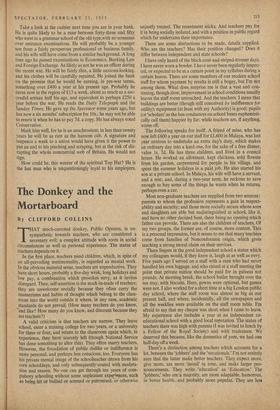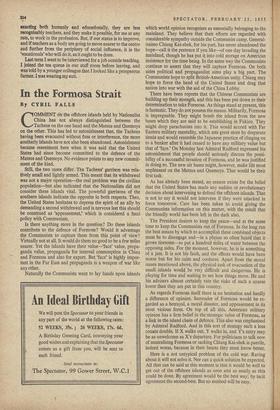The Donkey and the Mortarboard
lly CLIFFORD COLLINS In the first place, teachers mind children, which, in spite of an all-prevailing sentimentality, is regarded as menial work. In the obvious material sense, teachers are unproductive. They have short hours, probably a five-day week, long holidays and low pay, a combination which provokes envy, as it invites disregard. Then, self-assertion is the stock-in-trade of teachers; they are unwelcome socially because they often carry the mannerisms and habits of thought which belong to the class- room into the world outside it where, in any case, academic standards do not prevail. (How many teachers do you know, and like? How many do you know, and discount because they are teachers?) unjustly treated. The resentment sticks. And teachers pay for it in being socially isolated, and with a position in public regard which far underrates their importance.
There are some distinctions to be made, details supplied. Who are the teachers? Has their position changed? Does it differ between independent and state schools?
I have only heard of the black-coat-and-striped-trouser days. I have never worn a bowler. I have never been regularly inspec- ted, or expected to be at a certain point in my syllabus during a certain lesson. There are some members of our modern school staff for whom payment by results is still a bogey, but I'm not among them. What does surprise me is that a vast and con- tinuing, though slow, improvement in school conditions usually leaves the staff room untouched. And the teachers. I mean that buildings are better (though still conceived by indifference for utility); equipment (at least with my Authority) is good; pupils (or 'scholars' as the bus conductors on school buses euphemisti- cally call them) happier by far; while teachers are, if anything, worse off.
The following speaks for itself. A friend of mine, who has now left £600 a year on our staff for £1,600 in Malaya, was last year anxious to undertake an extra day's duty, which makes an ordinary day into a hard one, for the sake of a free dinner. value ls. 7d. He has three children, and lived in a council house. He worked an allotment, kept chickens, sold flowers from his garden, carpentered for people in his village, and spent the summer holidays in a paid job. He also started his son at a private school. In Malaya, his wife will have a servant, and a rest; and, during a two-year term, he reckons to save enough to buy some of the things he wants when he returns, perhaps even a car.
Most non-graduate teachers arc supplied from two sources : parents to whom the profession represents a gain in respect- ability and security; and those more socially secure whose sons and daughters are able but undistinguished at school, like it, and have no other decided bent, there being no opening which father can provide. There are also the children of teachers. Of my two groups, the former are, of course, more content. This is a personal impression, but it seems to me that many teachers come from families of Nonconformist origin, which gives teaching a strong moral claim on their services. exacting both humanly and educationally, they are less recognisably teachers, and they make it possible, for me at any rate, to work in the profession. But, if our status is to improve, and if teachers as a body are going to move nearer to the centre and further from the periphery of social influence, it is the `vocationals' who will do it, as it ought to be done.
Last term I went to be interviewed for a job outside teaching. I joined the tea queue in our staff room before leaving, and was told by a younger colleague that I looked like a prosperous farmer. I was wearing my suit.











































 Previous page
Previous page